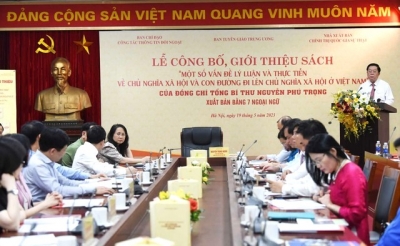
PROF., DR. PHAN KIM NGA
Institute of Marxism Studies, Chinese Academy of Social Sciences
ASSOC. PROF., DR. NGUYEN MINH HOAN
Academy of Journalism and Communication
(PTOJ) - This article summarizes the ideas on social progress and justice in the book “Some theoretical and practical issues on socialism and the path towards socialism in Vietnam” by General Secretary Nguyen Phu Trong. This article affirms that, with sharp theoretical thinking formed through the practice of leading the country and the nation, on the basis of the creative development of Marxism - Leninism and Ho Chi Minh Thought, the General Secretary has continued developing the ideas of social progress and justice in the cause of building socialism in Vietnam.
Highlights
- Thoroughly grasping Ho Chi Minh’s thought on the attitude toward mistakes and shortcomings
- The Vietnamese State has full power and fully exercises the power entrusted by the people
- Identify and fight against the allegations that distort religious freedom in Vietnam
- Completing mechanisms and policies on training and fostering Vietnamese intellectuals by 2030, with a vision towards 2045
- Crushing the slander and distorted claims of no democracy and human rights in Vietnam

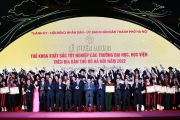
Dr. NGUYEN DUY QUYNH
University of Social Sciences and Humanities,
Vietnam National University, Hanoi
(PTOJ) - Developing talents is a national task of every country related to the development of the country and the survival of the nation. This article contributes to clarifying the outstanding contributions made by Ho Chi Minh in the field of talent development. These are important guidelines to help the Party and State set out policies to utilize and develop talents, serving the cause of national construction and development in the current period.
- Significance of the lessons: “The people are the root” and “The people are the center” in arousing and realizing the “aspiration to develop a prosperous and happy country”
- The sustainable value of Ho Chi Minh's moral thought
- Improve endogenous capacity in science and technology for promoting industrialization and modernization
- The unique and distincitve political thought of Ho Chi Minh
Assoc.Prof., Dr. LUU VAN QUANG
Institute of Politics,
Ho Chi Minh National Academy of Politics
(PTOJ) - Over the past 30 years, the Institute of Politics, under the Ho Chi Minh National Academy of Politics, has undergone a process of construction and development in all aspects. Basically, the Institute has effectively performed its assigned functions and tasks during each development period. The article reviews the development process of the Institute and its outstanding achievements in recent years in areas such as cadre training and fostering, scientific research, international cooperation, and other activities.
- Uphold the glorious tradition, continue to renovate, and strengthen the leadership of the Party Committee in the activities of the Academy of Journalism and Communication
- Increasing knowledge and professional skills in training human resources of the Vietnamese international press
- Applying Ho Chi Minh’s thoughts to present cadre training and fostering
- Vietnam’s increase in educational opportunities and development of highly-skilled human resource in light of systems theory approach

MA. DOAN THU ANH
Robert H. McKinney School of Law,
Indiana University
(PTOJ) - Vietnam is in the midst of a rapid digital transformation, with the objective of leveraging technology to advance the nation's development. A robust legal foundation is recognised as a pivotal element in achieving the goals of the National digital transformation program by 2025, with an orientation towards 2030, which is the development of three pillars: digital government, digital economy, and digital society. The article offers an overview of the legal system supporting the digital transformation in Vietnam and proposes some recommendations to promote the digital transformation process in the coming time.
- Law on digital administration in Vietnam: Current status and solutions
- The role of the State, market and society in occupational restructuring toward modern industry
- Sustainable tourism development in Vietnam
- Communication tasks for public authorities with the aim of rebutting wrong and hostile opinions
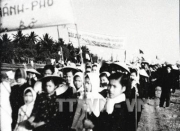
MA. NGUYEN THI BICH THUY
Academy of Politics, Region IV
(PTOJ) - The resistance war against the US for national salvation is known as the great epic of the Vietnamese people’s war in the 20th century. It was the triumph of the all-people, comprehensive, long-term resistance war, which was the combination of the highly promoted synergy with the strength of the times. The success of mass mobilization work, indeed, made a great contribution to promoting the synergy. This paper clarifies some basic viewpoints on mass mobilization work on the southern battlefield (1954-1975) and valuable lessons for mass mobilization work, boosting the strength of the entire people in the process of national construction and defense nowadays.
- The miracle of the Ho Chi Minh sea trail and lessons on promoting the will, aspiration and strength of national unity
- Ho Chi Minh’s will in building the Democratic Republic in Vietnam via General Election 1946
- Lessons of experience learned from the August revolution 1945
- Declaration of Independence and its immortal values
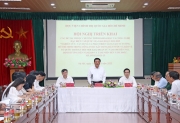
ASSOC. PROF., DR. DINH NGOC GIANG
Department of Scientific Management,
Ho Chi Minh National Academy of Politics
(PTOJ) - Based on the analysis of the peculiarities of scientific research at the Ho Chi Minh National Academy of Politics, this article points out the requirements for the management mechanism of political theory science and proposes an appropriate financial management mechanism, thereby contributing to expediting the successful completion of the Academy's future scientific tasks.
- Vietnamese cultural value system in the context of the Fourth Industrial Revolution
- Identifying manifestations of violations in the exercise of power at all stages of cadre personnel work
- Ho Chi Minh - Symbol of peace: the undeniable fact!
- Changes in family structure in rural area of Red river Delta
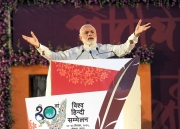
MA. TRAN BAO CHAU
Diplomatic Academy of Vietnam
(PTOJ) - India's achievements in comprehensive political, economic, and social development in recent years reflect the State's correct development path and the joint efforts made by the Indian people. The use of media in cultural diplomacy plays an important role in India's achievements. This article studies and outlines India's experiences in cultural diplomacy communication.
- Achievements and prospects in Vietnam - Pakistan relations
- Some solutions to improve Vietnam's role in asean-led multilateral mechanisms
- Looking back on the Vietnam - Malaysia strategic partnership from the perspective of nation-people interests
- Education of Marxism - Leninism, Kaysone Phomvihan Thought for young people in the central provinces of Laos
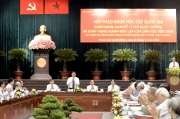
(PTOJ) - In order to celebrate the 80th anniversary of the Southern Uprising Day (November 23, 1940 - November 23, 2020), in November 22, in Ho Chi Minh City, Ho Chi Minh National Academy of Politics, Central Propaganda Commission of the Party and Ho Chi Minh City Party Committee coordinated to organize the national scientific conference titled "The Southern uprising - The strong will and aspiration for independence of the Vietnamese nation".
- Speech by Prof.Dr Nguyen Xuan Thang, Secretary of the Party Central Committee, Chairman of the Central Theoretical Council, President of HoChiMinh National Academy of Politics at the 3rd Party Committee Congress of the Centrally-run Businesses’Sector
- Conference to thoroughly grasp Directive No. 43-CT/TW of the Secretariat on strengthening the Party’s leadership in activities of the Vietnam Journalists Association in the new situation
- 13th National Party Congress adopts resolution
- National scientific conference “Nghe-Tinh Soviet movement: The power of the masses makes history”
A nation's power includes not only its hard power (geographical - population, economic, military factors) but also its soft power (political institution, ideology and national strategies (state leaders), and the will of the people in implementing strategies, social values, international relations). Therefore, the study of a country’s soft power should be taken under overall consideration of its comprehensive power.
Journal Archives
Journal Archives
Media
Photo Gallery
Contact us





